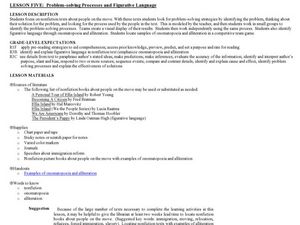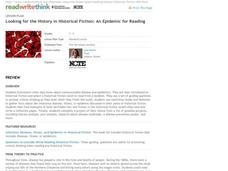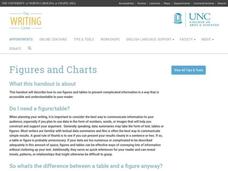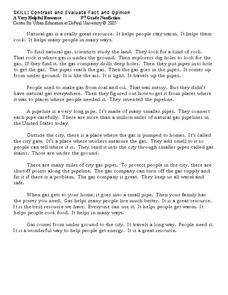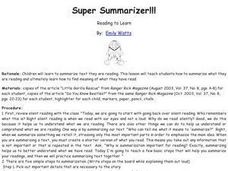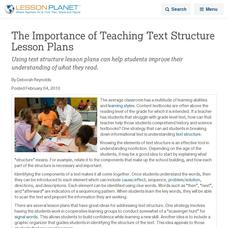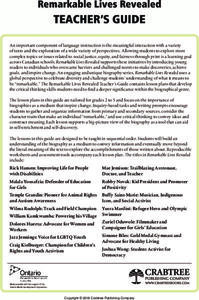Polk Bros Foundation
I Can Identify a Nonfiction Writer's Main Idea and Supporting Examples
Use this page to quickly identify the central idea of a text and organize ideas for writing an informational or explanatory text. The worksheet is split into two parts. In the first part, pupils note down the main idea and supporting...
Curated OER
Nonfiction Text: Comprehension Practice
A New York Times article about a 15-year-old style maven who in 2011 launched the fashion magazine "Rookie," based on her blog, makes high-interest nonfiction reading for secondary learners. This page asks 9 comprehension questions...
Curated OER
Irony in Poetry and Prose (Fiction and Non-fiction Texts)
Middle and high schoolers examine the impact of irony in poetry and prose. In this figurative language lesson, they read instructor-selected literature and identify uses of irony. Then they discuss how irony enhances literature.
Curated OER
Reading Comprehension Exercise
Looking to increase reading comprehension? Teach this lesson, which is flexible enough to use with either informational texts or with literature. Teams of boys and girls work together to answer a comprehension question after listening to...
Curated OER
Problem-Solving Processes and Figurative Language
Nonfiction texts about people on the move provide young readers with an opportunity to examine not only the problem-solving strategies employed by immigrants, but to also find examples of figurative language these writers use to tell...
DePaul University
Settlement
Early settlers in the American Midwest experienced constant struggle. This reading passage describes for young learners the hardships of homesteaders as they journeyed west and sought to start a new life. When finished, students identify...
DePaul University
Egypt
The country of Egypt is more than just big pyramids and ancient pharaohs. After reading a brief overview of this African nation, young learners will demonstrate their understanding of the text by identifying the main idea and supporting...
ReadWriteThink
Looking for the History in Historical Fiction: An Epidemic for Reading
Combine informational reading skills with fictional text in an innovative historical fiction lessons. After reading a fictional text related to diseases, class members read non-fictional text to gain knowledge about specific infectious...
Mr. Nussbaum
Harriet Tubman
Scholars test their reading comprehension skills with a short reading of an informative text about Harriet Tubman. Learners answer eight questions and receive a detailed progress report.
University of North Carolina
Figures and Charts
Sometimes words aren't the best way to get information across to the reader. The eighth handout in the 24-part Writing the Paper series describes different type of figures and charts to display complex information in a paper....
Curated OER
Purposes of Reading Fiction and Nonfiction
How does the purpose of a fiction book differ from the purpose on a non-fiction text? Model for your young readers a scenario in which each kind of book might be useful or fun to read and show examples of each genre. A list of suggested...
DePaul University
Bold Plans, Big Dreams, City Progress
Determining which statements represent fact or the author's opinion in an integral part of reading informational text. Encourage seventh graders to read a passage about Barack Obama and the city of Chicago, as well as a passage focused...
DePaul University
Contrast and Evaluate Fact and Opinion
Looking for a resource that helps learners practice identifying fact and opinion? A four-page worksheet includes two informational text reading passages. Pupils read each passage and respond to four multiple choice and one short answer...
Newsela
Understanding "A Long Walk to Water"
What is the secret to success? Scholars use close reading of a variety of articles to determine characteristics of people that overcame hardships to become successful. While reading, pupils annotate their copies, make claims, and...
Making Evidence-Based Claims: Grade 7
The most effective way to support an argument is with clear and relevant evidence. As seventh graders read and listen to Cesar Chavez's California Commonwealth Club Address, they work through five sections of a textual analysis unit,...
Curated OER
Determining Author's Point of View: The Sneeches
Determine the author's point of view in a text. Young readers read Dr. Seuss' The Sneeches and identify the author's purpose in the story. They identify persuasive techniques in writing, asking and answering questions to better...
Curated OER
Super Summarizer!!!
Emerging readers summarize a nonfiction text using a five step process. After a brief demonstration of the five-step method for summarizing text, they read a nonfiction article and write their own summary. A checklist of each summary is...
Curated OER
The Importance of Teaching Text Structure Lesson Plans
Using text structure lesson plans can help students improve their understanding of what they read.
Curated OER
Paraphrasing and Summarizing
Read an article about the migration of our ancestors and write a paragraph. Pupils paraphrase and summarize to restate the information found in a nonfiction text. They write a shortened version of the reading to demonstrate the...
Curriculum Corner
I See a School
Enthusiastic readers report on a book detailing what it's about and their favorite part with a picture-based writing template. A nonfiction version takes a step further to highlight what the pupil learned, and a fiction version showcases...
Crabtree Publishing
Remarkable Lives Revealed
Six lessons make up a unit all about biographies. Scholars read about a remarkable life while taking notes and identifying characteristics of the biographical genre. Readers examine the tale's obstacles, accomplishments, and sequence of...
DeKalb County Schools
Compare/Contrast
A series of reading activities is sure to engage your young readers! Based on comparing and contrasting ideas, the packet provides opportunities to compare characters, themes, texts, and other elements of fiction.
T. Smith Publishing
Earth
Young astronomers read an informational text passage and then answer questions based on what they read.
Curated OER
"I Can” Common Core! 6th Grade Reading
It is much easier for kids to know they have reached a goal when that goal is clearly defined. By providing sixth graders with a checklist of Common Core reading standards written in "I can" format, each child can keep track of his own...






